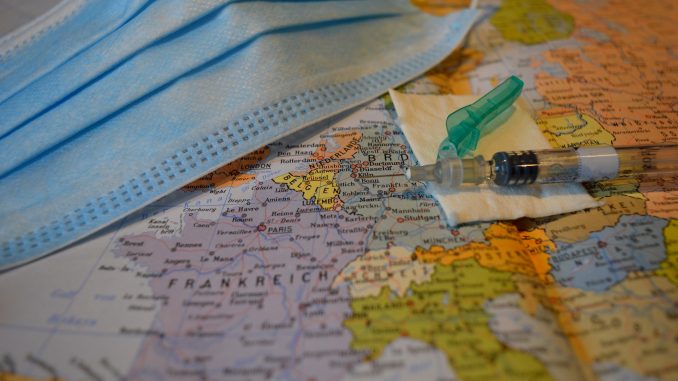
In a global first, UK cruise operator Saga Cruises has announced that from the start of the new season in May, all passengers will have to be fully vaccinated against Covid-19 before boarding. The move comes as cruise companies in the UK and abroad attempt to rebuild both the public confidence and the revenues that have been so devastatingly impacted by the spread of the coronavirus pandemic. Last year, unsurprisingly, was the worst on record for tourism. Official WTO estimates for 2020 suggest the global economy suffered to the tune of more than US$2 trillion due to the catastrophic effect of coronavirus on international tourism.
What’s more, the cruise sector has been particularly hard-hit. Some of the earliest mass outbreaks outside of China took place aboard cruise ships, with a handful of high-profile superspreader events forcing many cruise companies to completely shutter their operations for the duration of the health emergency. In the UK, “ghost ships” drifting around the English Channel, unable either to sail or to pay hefty port fees to dock, became both an unlikely tourist attraction and a potent symbol of the daily damage to the industry which normally contributes more than £10 billion to the British economy.
Vaccine programmes offer hope
The fact that more than 10% of the British population has now received their first dose of the coronavirus vaccine is raising hopes that those ghost ships will soon be back on the high seas; the commencement of similar vaccination programmes across the globe has boosted morale in the hard-hit tourism sector. Saga’s new vaccination policy offers a clue at how other operators can look forward to a more buoyant 2021 while still keeping passengers and crew safe.
The vaccine requirement came backed by popular support: a poll of 2000 loyal Saga passengers (mainly Brits aged 50+) found an overwhelming majority in favour of the move and there’s been a surge in bookings since the announcement. Saga Cruises’ vaccination requirement may turn out to be quite prescient, if it’s able to breathe new life into an industry which has been ravaged by the pandemic.
Passport to normality?
More broadly, Saga’s decision underlines the fact that people will increasingly be asked to prove their Covid vaccination status in order to carry out the kind of activities most of us took for granted twelve months ago. While these requests may initially be confined most specifically to travel and hospitality arrangements, they could potentially affect everyday activities such as theatre bookings, festivals, concerts and other public gatherings.
There have already been urgent calls from prominent tourism bodies to implement such a system. The World Tourism Association is lobbying for the establishment of standardised digital certification schemes coupled with harmonised testing protocols to expedite safer cross-border travel, while industry experts anticipate that proof of vaccination will become a prerequisite for travel in the coming months.
Opponents have argued that so-called vaccine ‘passports’ would compromise data privacy for millions and open the door to more intrusive health tracking schemes. The idea of immunity certification, however, is an extremely persuasive one, especially in the EU where deaths from Covid already exceed half a million and where extended restrictions are becoming a way of life for millions more.
Implementing a secure system
Some countries are already trialling solutions. All 4800 Icelanders who have received both doses of the coronavirus vaccine, for example, have received special digital certificates which Reykjavik hopes will allow them to bypass testing and quarantine requirements at the border. Vital to any such scheme, however, will be the ability to verify vaccination status quickly and accurately, leaving no room for fraud while still protecting people’s privacy.
The UK, for all its success in building up a head start in vaccinations per capita, seems behind the times in terms of implementing a robust system which would allow those who’ve already had their jab to regain their freedoms and restart the economy. Like many countries, the UK is currently issuing flimsy vaccination cards which lend themselves to forgery, adding to widespread concerns that the proliferation of black market certificates purporting to show Covid-19 test results or vaccination history will undermine efforts to limit the spread of the disease and reopen travel routes.
Private companies, however, are stepping up to the challenge. Swiss security firm SICPA has deployed its existing blockchain-based CERTUS digital seal technology to create a tamper-proof system for vaccination and other health records. Using the CERTUS system, both paper and digital certificates can swiftly be verified by scanning a secure QR code with either a smartphone or a computer. Thanks to the digital security seal, this authentication is possible without storing any personal data in a database—resolving one of the main privacy concerns about other vaccine passport schemes.
Looking to the future with confidence
This kind of system could be precisely the type of lifeline which the stricken tourism industry, and everyone looking forward to returning to ‘normal’ life as soon as possible, are desperate for. Many countries have dragged their feet on the idea of vaccine passports, citing valid concerns about privacy and discrimination. It’s increasingly clear, however, that ready and verifiable access to health information is key to resuming economic and social activities without provoking fresh waves of infection and impacting already beleaguered health systems.
Saga Cruises has taken a bold step in a bid to re-energise its business, supporting its strict vaccine rule with additional measures – including lower passenger numbers, enhanced cleaning protocols, and uprated medical facilities – designed to reassure customers. If companies are prepared to lean into the idea of vaccination passports, governments should also ensure any system put in place is robust.


Leave a Reply